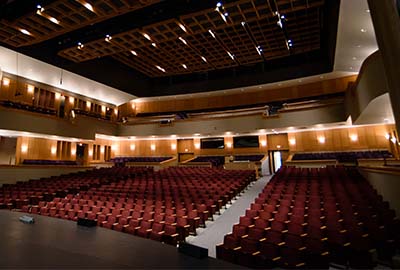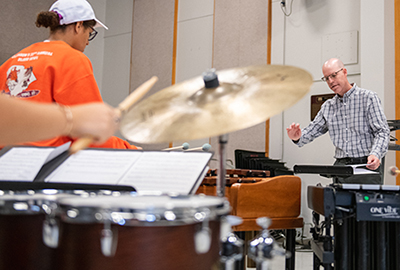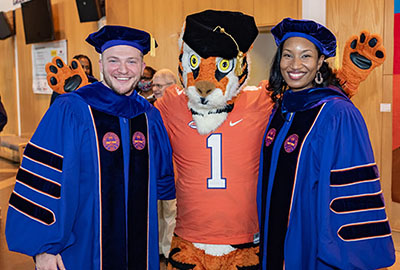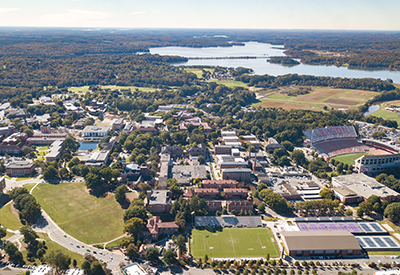Elevate Your Music Leadership
The Master of Music Education at Clemson University is a 33-credit, three summer program designed with working educators in mind. Our program supports expertise in band, choral and orchestral music programs with a focus on elevating teachers' skills in pedagogy and administration. Candidates can look forward to personalized instruction in a face-to-face setting at Clemson's Brooks Center for the Performing Arts. We are accepting applications for Summer 2025 with an application deadline of March 1, 2025.
Contact Us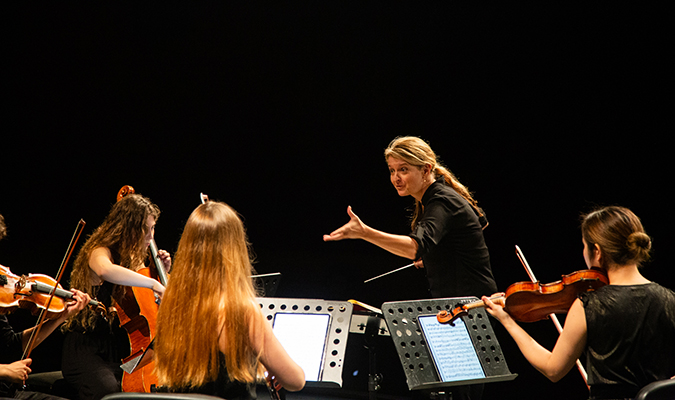
About the program
- Summer program designed for working educators
- Total of three summer sessions to complete the degree
- 33 credit hour degree program
- Choral or Instrumental track
- All face-to-face instruction
- Coursework includes skill development in applied research, conducting, history and philosophy of music education, teaching methods and music program administration.
- Learn in the environment of an All-Steinway School.
-
Application
We are accepting applications for Summer 2025 with a deadline of March 1, 2025.
Prospective students will begin by filling out an application to the Clemson University Graduate School.
In addition to the standard Graduate School application, candidates for the Master of Music Education are required to submit:
- Vita/Resume
- Include education, background, experience, honors and awards, publications, names of former teachers, and any other important information.
- Statement of Teaching Philosophy
- There is no required format or prompt for this. 1-2 pages in length.
- Sample Teaching or Rehearsal Video
- 10-minute video (minimum)
- References (3 required)
- Please include your references' contact information.
Application materials should be submitted to Anthony Bernarducci, MME Program Director and Director of Vocal Studies.
- Vita/Resume
-
Curriculum
The 33-credit program features two tracks: choral or instrumental. Six credits of electives will be selected in consultation with the student's adviser.
Summer 1
Summer 2 Summer 3 Applied Research in Music Education: 3 credits Pedagogy of Teaching and Learning for Music Educators: 3 credits Advanced Conducting: 3 credits Choral* or Instrumental+ Methods: 3 credits Band/Orchestral Administration+ or Advanced Vocal Seminar*: 3 credits Choral* or Instrumental+ Literature: 3 credits Seminar in the Aesthetics of Music and Performance: 3 credits Foundations of Music Education: 3 credits Graduate Capstone Project: 3 credits Elective: 3 credits Elective: 3 credits Total Semester Hours: 12 Total Semester Hours: 12 Total Semester Hours: 9 *Choral track only
+Instrumental track only
-
Course Descriptions
Seminar in the Aesthetics of Music and Performance 8010
This course will examine questions such as: what is music and why does it exist; what is art; what is beauty; what is aesthetic experience? We will look at what the important philosophers, from Plato to contemporary authors, have said about music and its effect on the performer and listener. We will touch on the science of music, including perception of pitch, rhythm, and timbre, as well as music as language.
Foundations of Music Education 8020
This course will examine and discuss historical and contemporary philosophical ideas and current challenges in music and music education. Students will gain a deeper understanding of present thought in the field of music education in order to better inform their own curricular and instructional choice.
Applied Research in Music Education 8030
This course will cover theories, techniques, and methodologies for conducting, understanding, and practically applying music education research.
Pedagogy of Teaching and Learning for Music Educators 8100
Students will evaluate and challenge current practices and examine both new and traditional pedagogical approaches to teaching music. The course will explore what we teach, how we teach it, and how we learn.
Advanced Conducting 8120 (Combined choral and instrumental tracks)
This course will challenge students to evaluate and refine their own conducting techniques, explore new materials and philosophies related to conducting, and examine different pedagogical approaches (often integrating new technology) to the rehearsal technique of the wind/choral/string ensemble. Students will demonstrate conducting technique, rehearsal pedagogy, and score analysis.
Choral and Instrumental Methods 8130/40 (Separate courses choral and instrumental)
This course will present a practical approach to the choral/instrumental classroom. An emphasis will be given to integrating technology into a modern classroom to supplement pedagogy and help with score preparation, rehearsal planning, problem-solving, developing musicianship and inspiring artistry in future students.
Choral and Instrumental Literature 8210/20 (Separate courses choral and instrumental)
(Choral) This course presents a broad survey of historic and new choral literature, including masterworks in the practical context ofconcert programming. This course also includes instruction on choral music sources and performance practice.
(Instrumental) This course will present a broad survey of historical and new wind literature. Students will explore masterworks, pieces on the South Carolina Band Directors Association (SCBDA) Concert Band Performance Assessment Music List, and new works from current composers. Collaboration with composers, sources for music and programming strategies will also be presented.
Band and Orchestral Administration 8230 (Required for Instrumental Track)
This course will cover a wide variety of topics vital to the administration of a band/marching band program, such as budgets, travel, band booster clubs, fundraising, running large educational events such as summer band camp, using technology and managing a large staff and student leadership team.
Advanced Vocal Seminar 8240 (Required for Choral Track)
Advanced vocal techniques for teaching choirs and individual singers healthy habits for singing. This course will explore techniques for alignment, breathwork and range exercises for singers and will share practices for maintaining vocal health. Elements of diction, vocal literature and performance practice will also be examined.
Capstone 8300
Students will be advised by a major professor on a capstone project in the following categories: Conducting Recital, Research Project and Thesis. Specifics will be agreed upon by the student, adviser and advisory committee.
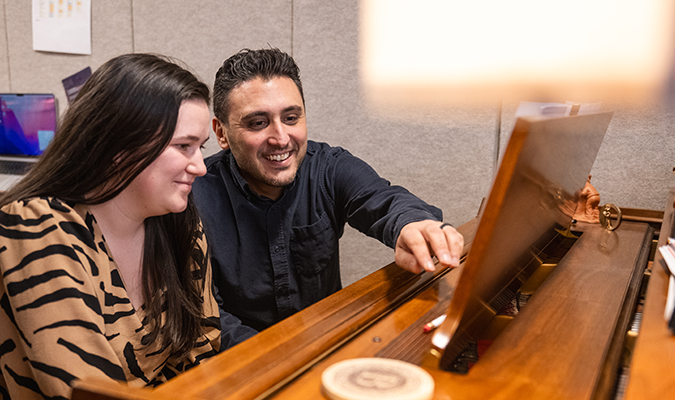
Meet the Program Director
Associate Professor Anthony Bernarducci
Anthony Bernarducci is an Associate Professor of Music at Clemson University and serves as Director of Vocal Studies for the Department of Performing Arts. He conducts the Clemson University Singers and is the founding director of Clemson’s chamber choir, Cantorei. In addition, he teaches courses and private lessons in composition. As an author, Bernarducci has published articles on topics ranging from music education to performance practice. His book, titled "Listening Awareness: Build Independent Creative Listeners in Choir,” is published with GIA publications. Bernarducci is an active composer and has works published with GIA Publications, Gentry Publications, Hinshaw Music and ECS Publishing Group. His compositions have been performed around the world.
Faculty profile
